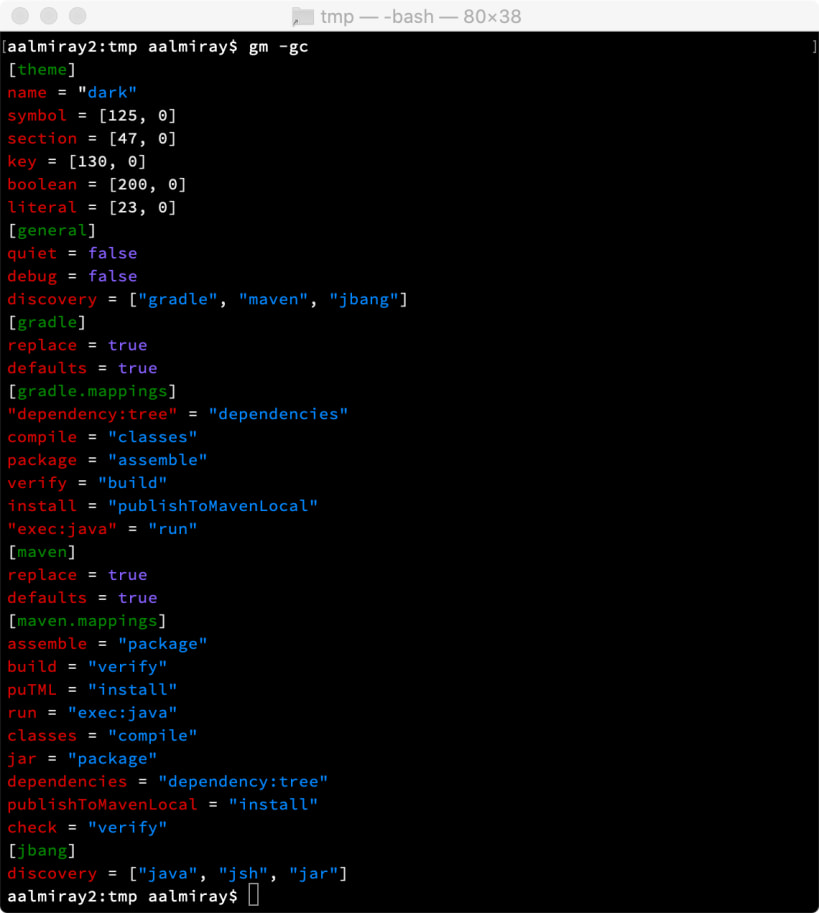




Gum is a Gradle/Maven/Ant/Bach/JBang wrapper written in Go, inspired in https://github.com/dougborg/gdub and https://github.com/srs/gw. Gum automatically detects if the project is Gradle, Maven, Ant, Bach, or JBang based and runs the appropriate command. However in the case that Gum guesses wrong you can force a specific build tool to be used. Similarly as gdub, Gum lets you invoke either Gradle, Maven, or Ant from anywhere within the project structure, not just the root directory.
Usage
Gum supports the following flags
Gum will execute the build based on the root build file unless -gn is specified, in which case the nearest build file will be selected. If a specific build file is given (-b, --build-file for Gradle; -f, --file for Maven, -f, -file, -buildfile for Ant) then that file will be used instead.
Thank you for your report. Information you provided will help us investigate further.
There was an error while sending your report. Please try again later.
You are about to open
Do you wish to proceed?
Snaps are applications packaged with all their dependencies to run on all popular Linux distributions from a single build. They update automatically and roll back gracefully.
Snaps are discoverable and installable from the Snap Store, an app store with an audience of millions.

Snap is available for Red Hat Enterprise Linux (RHEL) 8 and RHEL 7, from the 7.6 release onward.
The packages for RHEL 7, RHEL 8, and RHEL 9 are in each distribution’s respective Extra Packages for Enterprise Linux (EPEL) repository. The instructions for adding this repository diverge slightly between RHEL 7, RHEL 8 and RHEL 9, which is why they’re listed separately below.
The EPEL repository can be added to RHEL 9 with the following command:
sudo dnf install https://dl.fedoraproject.org/pub/epel/epel-release-latest-9.noarch.rpm
sudo dnf upgrade
The EPEL repository can be added to RHEL 8 with the following command:
sudo dnf install https://dl.fedoraproject.org/pub/epel/epel-release-latest-8.noarch.rpm
sudo dnf upgrade
The EPEL repository can be added to RHEL 7 with the following command:
sudo rpm -ivh https://dl.fedoraproject.org/pub/epel/epel-release-latest-7.noarch.rpm
Adding the optional and extras repositories is also recommended:
sudo subscription-manager repos --enable "rhel-*-optional-rpms" --enable "rhel-*-extras-rpms"
sudo yum update
Snap can now be installed as follows:
sudo yum install snapd
Once installed, the systemd unit that manages the main snap communication socket needs to be enabled:
sudo systemctl enable --now snapd.socket
To enable classic snap support, enter the following to create a symbolic link between /var/lib/snapd/snap and /snap:
sudo ln -s /var/lib/snapd/snap /snap
Either log out and back in again or restart your system to ensure snap’s paths are updated correctly.
To install gum, simply use the following command:
sudo snap install gum --classic
Browse and find snaps from the convenience of your desktop using the snap store snap.

Interested to find out more about snaps? Want to publish your own application? Visit snapcraft.io now.